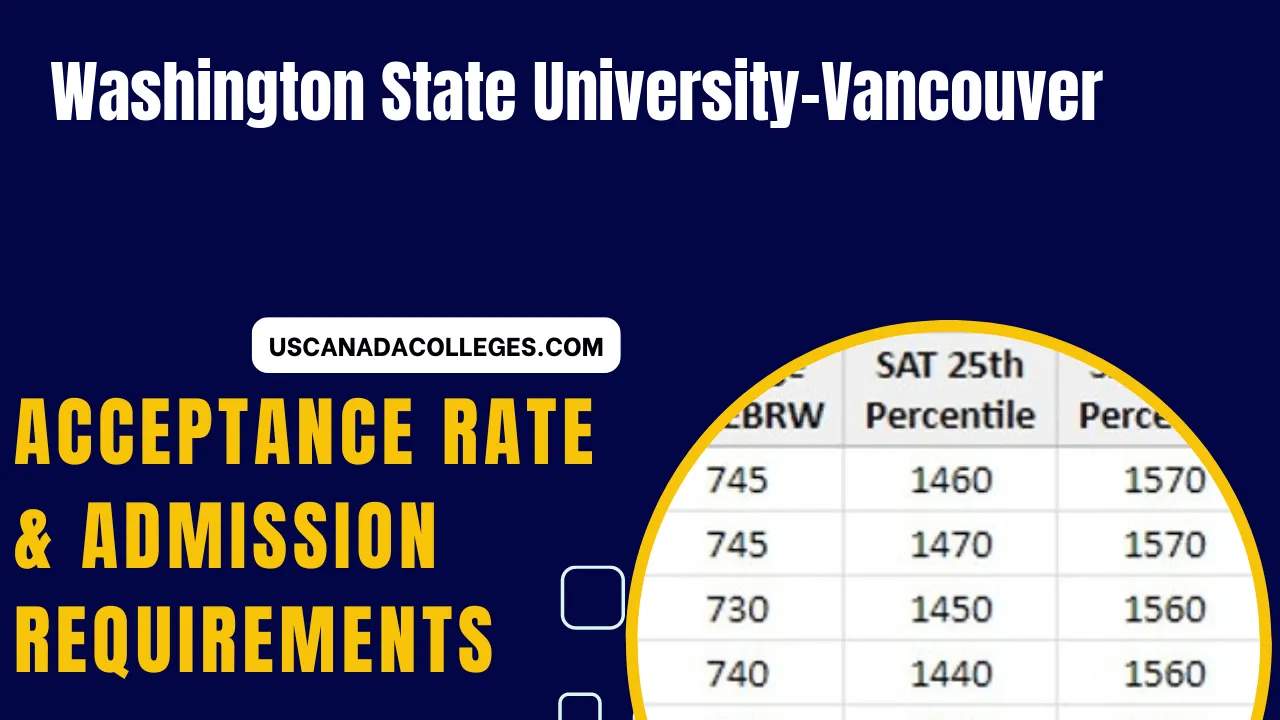The acceptance rate of Washington State University-Vancouver is not reported. The admission process at Washington State University-Vancouver is not very strict. Most institutions whose acceptance rate is not reported do not have a high acceptance rate. Hence, we may assume that Washington State University-Vancouver's admission criteria are not very strict. However, this does not mean that every applicant will be admitted.
To secure admission to Washington State University-Vancouver, perform well in academics and other activities. Meeting Washington State University-Vancouver's GPA and standardized test (SAT/ACT) requirements is crucial, as failing to do so may prevent your application from moving forward. Additionally, a well-written letter of recommendation, your participation in co-curricular and extracurricular activities, and your interpersonal communication skills can improve your chances of admission.
Washington State University-Vancouver Admission Requirements
Can I Get Into Washington State University-Vancouver Without SAT Or ACT?: The admission test score (SAT/ACT) policy for Washington State University-Vancouver is unknown. But it is better to submit the test score if you have performed well in the test. It gives an extra opportunity to showcase your skills and competencies and hence will improve your chances of admission. Check the schedule of the test and plan accordingly. It is advisable to appear multiple times in the test unless you score well above the average SAT / ACT score of the admitted students, as given below. Normally, students may appear in the test 4 to 5 times to improve their scores. But if your score is not up to the mark and is less than the national or state average, then it is better not to submit the score as it will impact negatively.
Washington State University-Vancouver SAT Requirements
Each school has different requirements for SAT and ACT testing. Only a few schools require the SAT or ACT, but many consider your scores if you choose to submit them. The test score policy is already mentioned.
Washington State University-Vancouver Profile
Name: Washington State University-Vancouver
City: Vancouver
State: Washington
Type: Public
Zip: 98686-9600
Campus: Branch Campus
Accredited by: Northwest Commission on Colleges and Universities (NWCCU)
How much a Washington State University-Vancouver Graduate make?
The average annual salary of the Washington State University-Vancouver graduate after 4-6 years of graduation is USD 68905. An average Washington State University-Vancouver graduate makes this much after 10 years of enrollment (4-6 years after graduation).
The average annual income of a graduate in the United States is USD: 40595
Degree Programs
Frequently Asked Questions About Washington State University-Vancouver Admissions
Answer: Graduates of this university typically earn a moderate salary, $68905 annually, with some fluctuation based on the field.
Question: Is it possible to transfer to Washington State University-Vancouver from another university?
Answer: Yes, many students successfully transfer to Washington State University-Vancouver each year. Be prepared with your academic transcripts, recommendation letters, and a solid personal statement to make your application competitive.
Question: What is the campus culture like at Washington State University-Vancouver?
Answer: The campus culture at Washington State University-Vancouver is diverse and vibrant, with numerous student organizations, sports teams, and cultural activities. It’s an ideal environment for personal growth and building lifelong connections.
Question: How can I improve my chances of getting into Washington State University-Vancouver?
Answer: To improve your chances, focus on excelling academically, building a strong extracurricular profile, and submitting standout essays. High SAT/ACT scores are also crucial for competitive admissions.
Full list of All degree programs offered by Washington State University-Vancouver.
Data on this page is sourced from IPEDS, College Scorecard's latest data as provided in 2025, US Department of Education's latest 2025 statistics, Institute's official websites and printed material as well as additional publicly available sources.
